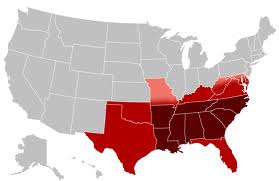Southerner sayings: American expression you might hear in the South Posted by Gabriele on Feb 25, 2014 in English Language
The American South in red.
All around the United States, Americans speak in different local dialects, with slightly different pronunciation, accents, with different sayings or idioms. (Check out this other post I have written on American dialects.). A Southern accent or dialect is one of the most common dialects you will come across in America. A “southerner” is anyone who lives in these states: Virginia, West Virginia, Maryland, North Carolina, South Carolina, Georgia, Florida, Alabama, Kentucky, Mississippi, Tennessee, Arkansas, Louisiana, Oklahoma, and Texas. Not everyone who lives in these states will consider themselves a southerner, nor will they all talk with a southern accent, but this is the general region of what is considered “the south” in America.
The most common southerner saying is likely the word “y’all.” This is a contraction of the words “you” + “all” and means ‘all of you’ or ‘you guys.’ It is a plural second person pronoun in English. It is used like this: “Why don’t y’all come over for dinner after work?”
Apart from using the word y’all and having their own accent, “southerners” also have some of their own sayings, which I am going introduce today. If you are ever traveling in the southern part of the United States or if you meet someone from that region, you might hear some of these sayings.
“We’re living in high cotton.”
Cotton has always been an important crop in the South. So every harvest farmers hope for tall cotton bushes with a lot of white fluffy cotton. Tall cotton bushes are easier to pick and they produce more cotton than short ones. If you’re living in “high cotton,” it means you’re feeling successful or wealthy.
“She is madder than a wet hen.”
Hens lay eggs, and they will stop at nothing to incubate* their eggs. They will get very upset when farmers try to collect their eggs at times. So, farmers used to dunk hens in cold water to stop the hens from being so agitated or aggressive about protecting their eggs. The hens don’t like this much so they get mad, very mad, about being wet. I think I’d get mad about this too if I were a hen!
“You can’t make a silk purse out of a sow’s ear.”
A pig’s ear (also called a sow’s ear) may look soft, pink, and shiny, but if you try and make a pretty soft pink shiny purse out of it you won’t get exactly what you wanted. This saying means that you cannot make a good quality product by using bad quality material.
“She’s as happy as a dead pig in the sunshine.”
When a pig dies outside the sun dries out its skin. When this happens the pig’s lips get tight and pulled back so it looks like the pig is smiling, making the pig look happy even though it’s dead. This phrase describes a person who’s happily ignorant of reality.
“I’m finer than frog hair split four ways.”
A southerner might use this phrase to answer the question, “How are you?” This phrase means that the person is feeling very good.
“That thing is all catawampus.”
Catawampus is a southern way of saying, askew, awry, not right or out of alignment.
*incubate = to keep an egg warm so it will hatch

Build vocabulary, practice pronunciation, and more with Transparent Language Online. Available anytime, anywhere, on any device.
About the Author: Gabriele
Hi there! I am one of Transparent Language's ESL bloggers. I am a 32-year-old native English speaker who was born and raised in the United States. I am living in Washington, DC now, but I have lived all over the US and also spent many years living and working abroad. I started teaching English as a second language in 2005 after completing a Master's in Applied Linguists and a Certificate in English Language Teaching to Adults' (CELTA). Since that time I have taught ESL in the United States at the community college and university level. I have also gone on to pursue my doctorate in psychology and now I also teach courses in psychology. I like to stay connected to ESL learners around the world through Transparent Languages ESL Blog. Please ask questions and leave comments on the blog and I will be sure to answer them.




